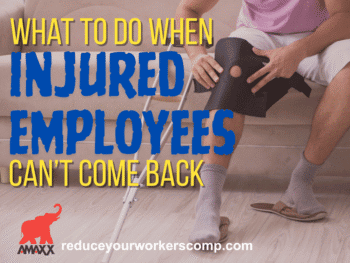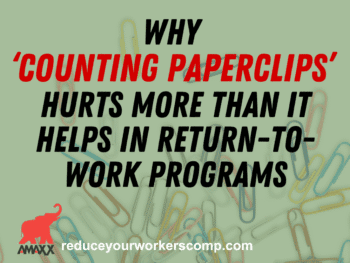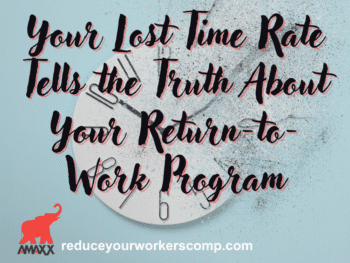Shortly after an employer signs up for workers’ compensation insurance, someone (broker, insurance agent, insurance company, claims professional) whispers in their ear. . . “What are your options for MODIFIED DUTY after an injury?”
A really important question, since getting employees back to work promptly after an injury has a measurable impact on claim costs.
Modified duty programs [a.k.a. transitional duty (TD) return-to-work (RTW)] often raise many questions for an employer. The first being, “You mean we have to pay injured employees to do a job they were not hired to do?” Of course, the answer is YES!!!
Now the, WHAT IF and DO WE HAVE TO questions start to flow. . .
What if we don’t really have a position to accommodate a sedentary or light duty release?
What if other employees get mad and quit because it’s unfair they have to do the injured employee’s job, plus their own, while the injured employee is just “sitting around?”
Do we have to have a RTW program?
The real question is . . . What benefit does my company get, if we have one? In truth, an Employer is not obligated to have a formal Modified/Light duty program; however, there are a couple of good reasons for doing so.
According to industry experts, once an employee is out of work for more than six months post injury, s/he is much more likely to remain in the workers’ compensation system indefinitely, known as “psychological disemployment” Getting injured workers back to work as quickly as possible, helps them retain their skills and promotes positive employee relations. Both are pretty good reasons to explore RTW programs.
A further benefit may show up in the employers “bottom line.” By providing a modified/light duty opportunity, employers reduce their workers’ compensation payout which may lower their “modifier.” This fact can have a dramatic impact on future workers’ compensation insurance premiums.
So what if injured employees fail to take advantage of the program? The modified/light duty job offer is just that, an offer of employment. When an injured employee fails to take advantage of the program, s/he runs the risk of losing workers’ compensation benefits. This fact is a strong motivator for compliance and a key factor in resolving future claim disputes.
Modified/light duty programs should be a part of the employer’s long-term risk management strategy. But state regulations do differ. The process of effectively creating, evaluating, or improving an employer sponsored RTW program may be a challenge.
If you’ve not already done so, it’s a great idea to consult with an experienced risk management professional or occupational/vocational counselor. These folks have real life experience with many types of employers and will be able to assure your program is effective and in compliance with specific jurisdiction requirements.
Construction, Transportation, Retail. . . What options do employers have when they truly do not have the ability to create alternative jobs within their company? Stay tuned for more info on a special variety of Modified Duty Program – Transitional Work Programs.
Author: Gordon R. Butler, national authority/consultant on employability & wage capacity in workers’ comp, liability, PIP and LTD Claims. He can be reached at 321-377-1164 (cell) or email gbutler@soarresearch.com www.gbutlerconsult.com
Follow Us On Twitter: www.twitter.com/WorkersCompKit
Do not use this information without independent verification.
All state laws vary.
©2008 Amaxx Risk Solutions, Inc. All rights reserved under International Copyright Law. If you would like permission to reprint this material, contact Info@WorkersCompKit.com



























